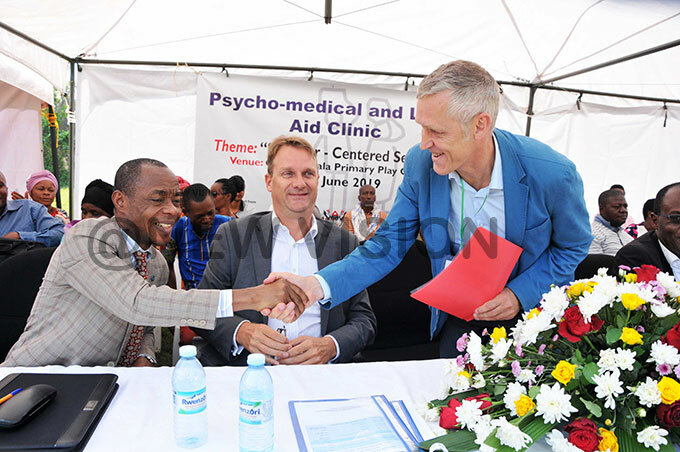Activists want interpreters in refugee hospitals
“Refugees find it hard to explain themselves to health workers due to language barrier, which makes it hard for them to get the right services when they visit health facilities,”
WORLD REFUGEE DAY
Activists have appealed to government and partners to provide language interpreters in the hospitals that serve refugees and asylum seekers.
While commemorating World Refugee Day in Kampala recently, David Onen of Refugee law project, said language barrier was affecting delivery of health services to refugees.
"Refugees find it hard to explain themselves to health workers due to language barrier, which makes it hard for them to get the right services when they visit health facilities," he said.
He said some of the revelations came to light when his organisation held a health camp for refugees and victims of torture in urban centers.

(Left to Right) Robert Ayeda Kotchani from the UN Office of the High Commissioner for Human Rights (OHCHR), H.E Henk Jan Bakker the Ambassador Of Netherlands in Uganda and Chris Dolan, the Director Refugee Law Project during the Psycho-medical and legal Aid Clinic held at Old Kampala Primary School. (Photo by Karim Ssozi.)
The health camp held under the theme: Survivors' Centred Services was meant to offer enough time to refugees to ask and explain what improvements they want in delivery of health services.
He said most refugees who come to Uganda can neither speak English nor Luganda, yet also chances are that the health workers cannot also speak Swahili or any of the refugees' languages.
Joyce Namutya, the officer-in-charge of refugees at the Office of the Prime Minister said over 1.4 million refugees are in Uganda of whom 74% come from South Sudan.
Quoting a 2018 survey of the UNHCR, about 100,000 refugees are urban dwellers, and many of them can't speak English, Namutya said during the meeting.
She, however, warned Ugandan Refugees and community members against discriminating refugees and said that one should treat others the way they want to be treated.
"You can also become a refugee and every one of us is a potential asylum seeker, treat people the way you want to be treated," she warned.
Chris Dolan, the director of Refugee Law Project said like refugees, victims of torture are subjected to persistent health challenges which call for psychological support.
"If you are a victim of torture, you will often have health concerns. You will often not only require medical support but also psychological and legal support," he said.
While condemning the practice of torture, Dolan said it affects not only the victim but also families, society and the country at large.
Robert Kotchani, the country representative of the Office of the United Nations High Commissioner for Human Rights said all actors must come together to end torture and hold those responsible to account.
"Torture, if not causing death, usually leaves deep-seated effects on victims. A situation can be aggravated for those who have been forced to flee their homes, beyond national borders," he said.
He noted that although many countries in Uganda have taken steps to fight torture, a holistic approach was needed to help torture victims to cope with the effects of the crime, in line with UN conventions.
"Beyond the talk, we must all walk the talk and ensure that our interventions are felt by those who require them most," Kotchani said.